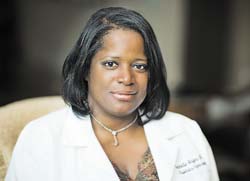HEALTHIER YOU: Understanding breast cancer
October 2, 2017 by Las Vegas Black Image Magazine
Filed under Health, Highlights
BY DR. ANNETTE MAYES, OB/GYN
October is Breast Cancer Awareness Month — and it is crucial that women make it a point to do self-breast exams and get regularly-scheduled mammograms.
There are some people who feel that breast cancer will never happen to them. But breast cancer does not discriminate; other than skin cancer, it is the most common cancer among women in the United States. Some women are at higher risk for breast cancer than others because of their personal or family medical history — or due to certain changes in their genes.
One thing that can lower the risk of dying from breast cancer is to get regular mammograms. The United States Preventive Services Task Force recommends that average-risk women who are 50 to 74 years old should have a screening mammogram every two years. Average-risk women who are 40 to 49 years old should talk to their doctor about when to start, and how often to get a screening mammogram.
Mammograms are covered by most health insurance programs. You can get a screening mammogram without any out-of- pocket costs. If you are worried about the cost or don’t have health insurance, organizations such as CDC and Planned Parenthood can be of assistance.
Symptoms of breast cancer vary from person to person. Some common breast cancer signs and symptoms include:
- Skin changes, such as swelling, redness, or other visible difference in one or both breasts.
- An increase in size or change in shape in the breast(s)
- Changes in the appearance of one or both nipples
- Nipples discharge other than breast milk
- General pain in/on any part of the breast
- Lumps or nodes felt on or inside of the breast
And here are some symptoms more specific to invasive breast cancer:
- Irritates or itchy breasts
- Change in breast color
- Increase in breast size or shape (over a short period of time)
- Changes in touch (may feel hard, tender or warm)
- Peeling or flaking of the nipple skin
- A breast lump or thickening
- Redness or pitting of the breast skin (like the skin of an orange)
For additional information, contact the Las Vegas All Women’s Care Offices at (702) 522-9640. Or visit us at 700 Shadow Lane No. 165 (1st floor) in Las Vegas.






